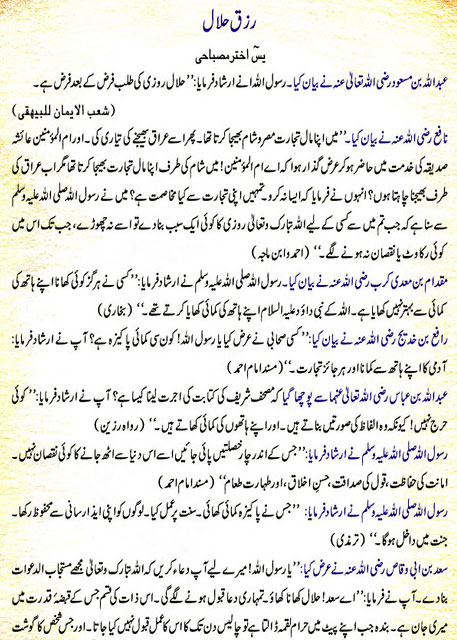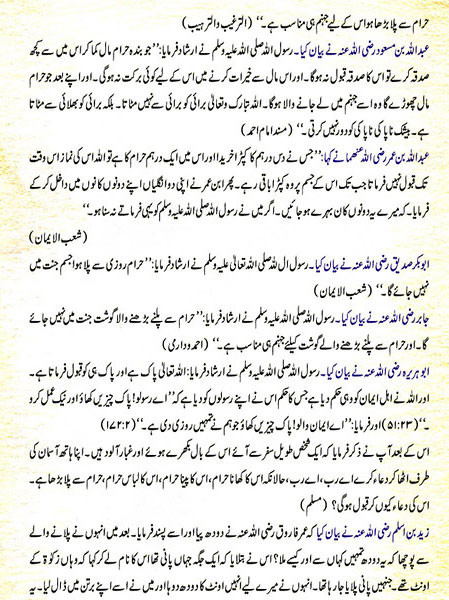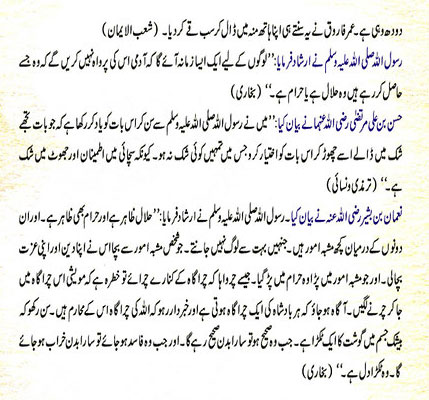
Prophet Muhammad (pbuh): Fun That Is Acceptable
No human being was ever required to fulfill a harder task than Muhammad (peace be upon him).
When God chose him to deliver His last message to mankind, He also charged him with its full implementation in a human society, so that his message would never be merely a theoretical outline of a code of living.
Future generations will always have the first Islamic society, established by the Prophet in Madinah and later in the entire Arabian Peninsula, as a model which they should emulate.
Thus, Muhammad’s task was to reform a human community, give it a new faith that outlines its constitution, establish a faith, and thus change the course of history.
What would have happened to humanity without Islam does not bear contemplation.
Prophet Muhammad addressed himself to his task, realizing from the very early days that it was a mammoth task that would occupy all his time.
Very early in his message he said to his wife: ‘Sleeping time is over, Khadijah’. He meant that he could never afford to sleep long on any night for the rest of his life.
With such an awareness of the task he was assigned, what it involved and what it required of him, we are surprised to see him laughing with his companions when the occasion arises.
When there was something really funny, he would laugh heartily.
Every aspect of Muhammad’s character was balanced to the most appropriate measure. Thus, he enjoyed fun but he tamed this with maintaining the truth.
He would start a joke, or say something in jest to a person but even in jesting he only said what was true.
A leading contemporary scholar, Abbas Al-Aqqad, says: “This means that his jesting was a sign of his prophethood, because it was a mark of his humanity. It was not in any way contrary to his status as God’s noble prophet and messenger.”
To take a couple of examples: his aunt, Safiyyah, requested him to pray for her to be in heaven. He said to her: “No elderly woman will enter heaven”.
As she was elderly, Safiyyah started to weep. He smiled and reminded her of a couple of verses in the Qur’an that make clear that all women in heaven will be returned to their youthful prime:
“We will have brought forth [their mates] in perfect creation, making them virgins, full of love, of matching age.” (56: 35-37)
She realized that the Prophet was only joking with her and she remained in hope that she would attain the happy status of the dwellers of heaven.
One of his companions asked the Prophet to give him a camel to ride as he was setting on a long journey.
The Prophet said to him: “Yes, I will give you one of the offspring of a she-camel.”
Thinking that the Prophet meant to give him a newborn camel, the man was disappointed, and said: “How will that help when I have a long journey ahead of me?”
The Prophet said: “Is a camel born to any creature other than a she-camel?” The man laughed.
However, only few such occasions are reported, because the Prophet was always attending to his great task with diligence.
He only jested to make a serious situation more relaxed, or to please a dear person. In this also he demonstrated his perfect human status.
– by Adil Salahi
- May, 26
- 2978
- Prophet Character
- More
A Mistake Worth Its Weight In Gold
From the Original Arabic Piece by Adel bin Muhammad al-Abdul ‘Aalee
Translated by Abu Dujanah
One of the Salaf entered a field, hungry and tired, so he wanted to eat, and his stomach was ‘rumbling’. He saw an apple tree, and picked an apple to eat. He ate half of it under the protection of Allah, then he drank from the river near the field. After that, he suddenly realised that he was not aware of what he did due to his hunger, and thought to himself: Woe to you! How can you eat someone else’s provision without permission. In remorse he was determined not to leave the place until he found the owner of the garden, and confess to him that he had eaten his provision without his permission. He looked around and saw a house and went up to the door and knocked on it.
The owner came out and asked him what he wanted.
The Salaf said: “I was hungry and entered your garden and took this apple and ate half of it, then I remembered it was not mine, and I came to beg you to forgive me for this mistake.”
The man replied, “I will not forgive you except on one condition?”
So the Salaf asked (and he is Thaabit bin Nu’maan), “What is your condition?”
The owner of the garden said: “I want you to marry my daughter.”
The honourable Salaf without hesitation said: “yes, I will marry her”. The father of the girl then said: “I want you to know that my daughter is blind and cannot see, dumb and cannot speak, deaf and cannot hear.”
The revelation shocked Thaabit bin Nu’maan and thoughts flashed through his mind – what a disaster – what’s he going to do? Then he remembered that the trials and tribulation he has to endure by accepting this woman as his wife, and taking care of her and serving her is better for him than to eat the food (sadeed) of hellfire due to the fact that he had eaten the apple without permission. He also realized that if he did not make amends, his days in the dunya are numbered. So he promised to marry the girl, and prayed for forgiveness and reward from Allah, the Lord of the Worlds.
The day of marriage came, and the man was nervous and very worried: “How will I enter upon a woman who does not speak, see, or hear?!” What a dilemma, and he wished the earth would swallow him before that happened (i.e. going the wedding ceremony), but he remembered Allah Subhanahu wa Ta’ala and said: “Laa Hawla wa laa quwata illa billah, wa inna lilah wa inna ilayhi raji’oon.” He went off to the wedding ceremony and when he arrived, his future bride stood up and greeted him, saying, “Assalamu ‘alaykum wa rahmatullahi wa barakatuhu.”
When he saw her, it took his breath away and remembered what he had imagined of the hoor il-‘ayn in paradise. Gaining his composure, he blurted out: “What is this? So you speak, see, and hear.” Thaabit bin Nu’maan then informed her what her father had to told him.
She gave him the most beautiful smile and said: “My father spoke the truth and he didn’t lie.”
“But why did he tell me things about you which are untrue?
She replied, “My father said I am dumb, because I have never said a word which displeases Allah, nor have I ever spoken to a man whom it is not permissable to speak to. [He said] I am deaf, because I have never sat it in a place where malicious backbiting, gossip or tale-telling takes place. [He said] I am blind because I have never looked at a man who was not permissable for me to look.”
So ponder how Allah Subhanahu wa Ta’ala united this pious woman to this pious man.!
Rizq-e-Halal



Toward A Higher Level Of Fasting
It is Allah’s mercy, may He be glorified, that He placed no restriction on our eating and drinking during the rest of the year as long as what we consume is (i) Halaal, (ii) Tayyib (nutritious and clean), and (iii) not to be extravagant. We can eat or drink at any time, choosing from a wide variety of cuisines and delicacies: meats, dairy products, spices, herbs, leafy greens, fibers, staple grains, or frutis and vegetables, in whatever combination we like, because indeed the list of Halaal food is endless while the Haraam is only a restricted few.
The fact that Allah has made fasting obligatory is also a mercy from Him. Man’s nature is such that he takes for granted all good things that are easy to access and abundant in supply. He demeans their importance, and many a time, misuses them for his selfish needs.
Fasting from dawn to dusk with a conscious effort to abstain from sins of the tongue, ear, hands, eyes, or heart re-charges our faith and piety every year. Standing in prayers late at night while repenting our sins makes us more conscious of Allah throughout this month.
Think about it this way: Had this fasting not been obligatory, how many of us would have voluntarily fasted 30 days without any break? How many of us would have voluntarily listened to the Qur’an in prayer at night? How many of us would have willingly given a fixed portion of our wealth in charity to the needy? An honest answer shows us where we really stand as weak humans devoid of discipline and self-control. So definitely the obligation of fasting in Ramadan is a great mercy incurred upon us.
Muslims’ attitudes during Ramadan can really be divided into three types:
Only hunger
Prophet Muhammad (peace be upon him) mentioned this type of a person who leaves his eating, drinking and conjugal relations with his spouse, but does not give up indulging in sins like lying and backbiting. For example, you will see such a Muslim greet Ramadan with an attitude of dread, instead of excitement. They look forward to Eid with desperation as Ramadan goes on. You will notice them deliberately missing Taraweeh because “it is not Fard!,” lighting a cigarette as soon as the Maghrib adhan goes off, then missing the Salah in the Masjid as they stuff themselves to the hilt with food. Ramadan, to them, is a burden they cannot wait to offload from their backs.
“Many a person who fasts, gets nothing from his fasting except hunger and thirst.” (Ibn Majah, Ahmad)
Changed for a month
This fast is characterized by a believer becoming more conscious of Allah during Ramadan and therefore, trying to keep away from sins, and to fulfill Islamic obligations during this month. He gives up his bad habits, but temporarily, out of respect and sanctity for Ramadan. Consequently, you will see him or her change significantly during this month; becoming more devout and regular in worship Masha Allah, shunning gatherings that are a waste of time. However, this change may last only until the sighting of the Shawwal moon.
Superlative fasting
This is the higher form of fasting in Ramadan – the way how our Prophets and pious predecessors would fast. It is a fast that includes the heart; a fast in which the believer does not let negative emotions, sinful thoughts or vengeful feelings of animosity pervade his senses. As Sha’aban ends, he welcomes the opportunity of getting his sins forgiven. He gives up even mubah (permissible) actions to seize each moment as a precious gem to bond with Allah. He cautiously avoids situations that provoke anger or cause arguments with others, or those that ignite his lowly desires. You see him socializing less as Ramadan proceeds, his lips in visible motion, while doing mundane daily tasks, in remembrance of his Lord. During the last 10 nights, he can be seen earnestly supplicating and shedding tears in Sujood.
On the night before Eid, he holds back tears of sorrow while bidding Ramadan farewell. After Ramadan, you do not see him revert to a previous lifestyle of frivolity and carefreeness. Ramadan leaves him much improved in his piety and good deeds.
The good news is that this level of fasting is quite achievable, if one uses the opportunity to return to the Religion during this blessed month. This month has a night that is better than a thousand months, in which matters of Qadr are decided. Who knows, if we are sincere enough in our repentance and in our yearning for guidance, we may be a totally changed person before next Ramadan, Insha Allah.
Jang-e-Badar Kay Bad Maktuleen Makkah Say Rasool S.A.W Ka Khitab

Hadith On Breaking Fasting
Sahih Bukhari Hadith
Breaking fast at the end of the day
Hadith 3.175 Narrated by Umar bin Al Khattab (Radhiallah hu Taala anhu)
Allah’s Apostle (sallallaahu alayhi wa sallam) said, ” When night falls from this side and the day vanishes from this side and the sun sets, then the fasting person should break his fast.”
Hadith 3.176 Narrated by Abdullah bin Abi Aufa (Radhiallah hu Taala anhu)
We were in the company of the Prophet (sallallaahu alayhi wa sallam) on a journey and he was fasting, and when the sun set, he addressed somebody, “O so-and-so, get up and mix Sawiq with water for us.” He replied, “O Allah’s Apostle (sallallaahu alayhi wa sallam)! (Will you wait) till it is evening?” The Prophet (sallallaahu alayhi wa sallam) said, “Get down and mix Sawiq with water for us.” He replied, “O Allah’s Apostle (sallallaahu alayhi wa sallam)! (If you wait) till it is evening.” The Prophet (sallallaahu alayhi wa sallam) said again, “Get down and mix Sawiq with water for us.” He replied, “It is still daytime.”(1) The Prophet (sallallaahu alayhi wa sallam) said again, “Get down and mix Sawiq with water for us.” He got down and mixed Sawiq for them. The Prophet (sallallaahu alayhi wa sallam) drank it and then said, “When you see night falling from this side, the fasting person should break his fast.”
Breaking fast with water or anything available
Hadith 3.177 Narrated by Abdullah bin Abi Aufa (Radhiallah hu Taala anhu)
We were traveling with Allah’s Apostle (sallallaahu alayhi wa sallam) and he was fasting, and when the sun set, he said to (someone), “Get down and mix Sawiq with water for us.” He replied, “O Allah’s Apostle (sallallaahu alayhi wa sallam)! (Will you wait) till it is evening?” The Prophet (sallallaahu alayhi wa sallam) again said, “Get down and mix Sawiq with water for us.” He replied, “O Allah’s Apostle (sallallaahu alayhi wa sallam)! It is still daytime.” The Prophet (sallallaahu alayhi wa sallam) said again, “Get down and mix Sawiq with water for us.” So, he got down and carried out that order. The Prophet (sallallaahu alayhi wa sallam) then said, “When you see night falling from this side, the fasting person should break his fast,” and he beckoned with his finger towards the east.
Hastening the breaking of the fast
Hadith 3.178 Narrated by Sahl bin Sad (Radhiallah hu Taala anhu)
Allah’s Apostle (sallallaahu alayhi wa sallam) said, ” The people will remain on the right path as long as they hasten the breaking of the fast.”
Hadith 3.179 Narrated by Ibn Abi Aufa (Radhiallah hu Taala anhu)
I was with the Prophet (sallallaahu alayhi wa sallam) on a journey, and he observed the fast till evening. The Prophet (sallallaahu alayhi wa sallam) said to a man, ” Get down and mix Sawiq with water for me.” He replied, “Will you wait till it is evening?” The Prophet (sallallaahu alayhi wa sallam) said, ” Get down and mix Sawiq with water for me; when you see night falling from this side, the fasting person should break his fast.”
Breaking fast before time by mistake
Hadith 3.180 Narrated by Abu Usama from Hisham bin Ursa from Fatima (Radhiallah hu Taala anhaa)
Asma bint Abu Bakr (Radhiallah hu Taala anhu) said, ” We broke our fast during the lifetime of the Prophet (sallallaahu alayhi wa sallam) on a cloudy day and then the sun appeared.” Hisham (Radhiallah hu Taala anhu) was asked, ” Were they ordered to fast in lieu of that day?” He replied, “It had to be made up for.” Ma’mar (Radhiallah hu Taala anhu) said, “I heard Hisham saying, ” I don’t know whether they fasted in lieu of that day or not.”
Imbibe Spirit Of Ramadan
We Muslims must compete with one another in righteous deeds and work to alleviate the pain and suffering of the poor and needy, inspired by the spirit of the holy month of Ramadan.
This blessed month has taught us many lessons. We have to contemplate them to learn how people should be compassionate to their fellow beings, how the rich feel the suffering of the poor, and how Muslims compete with one another to win the pleasure of God. We Muslims must imbibe the true spirit of Islam, which is a religion of love, mercy and tolerance and promotes goodness, reform and dialogue.
We Muslims should participate actively in the creation of a human civilization.
The significance of Ramadan is that in this month the first verses of the Holy Qur’an were revealed to Prophet Muhammad (peace be upon him) as guidance to mankind and a criterion to differentiate between right and wrong. “Whoever fasts during Ramadan with faith and seeking reward from God will have his past sins forgiven.” a saying of the Prophet.
The role of Ramadan in deepening the qualities of kindness, forgiveness, mercy and showing sympathy to those who are less well off. It revitalizes the high values that our religion has taught us. It’s a month when the doors of the Heaven will be kept open and of Hell remain locked.
Naik Biwi Kay Fazail

Virtues Of Fasting In Summer’s Heat
Since Ramadan is during summer this year, Ibn Rajab’s section in “Lata’if Al-Ma’arif” (p. 272-273) about the virtues of fasting during hot days will serve as good encouragement:
“From the acts of worship whose reward is multiplied during the heat is fasting, and this is because of the thirst that one experiences in the midday heat.”
This is why Mu’adh Bin Jabal expressed regret on his deathbed that he would no longer experience this midday thirst, as other early Muslims did.
It was related that Abu Bakr would fast in the summer and not in the winter; and Umar advised his son Abdullah on his deathbed, “Try to obtain the characteristics of faith.” The first one he mentioned was fasting in intense summer heat.
And Al-Qasim Bin Muhammad said that Ayesha (may Allah be pleased with her) would fast in the intense heat. He was asked: “What drove her to do this?” He replied: “She would take advantage of the days before death.”
Some righteous women would choose the hottest days for fasting, saying: “If the price is low, everyone will buy,” meaning that they wanted to do deeds that only a few were capable of due to how hard it was to do them. This is indicative of the high aspirations these women had.
Ka’b said that Allah said to Musa: “I made it incumbent upon Myself that whoever is thirsty for My sake will have his thirst quenched on the Day of Resurrection.”
When Amir Bin Abd Qays went from Basrah to Sham, Mu’awiyah would ask him to tell him what he needed. Amir said: “All I need is for you to return the heat of Basrah to me to make the fasting a bit harder, as it is too easy in your lands.”
Al-Hajjaj was on a journey between Makkah and Madina. He pulled out his dinner and invited a bedouin to eat with him, and the bedouin said: “I have been invited by One who is better than you and I have accepted the invitation.” He asked: “And who is this?” The man replied: “Allah invited me to fast, and I fasted.”
Al-Hajjaj asked: “On this very hot day?” The man replied: “Yes. I am fasting it in anticipation of a much hotter day.” Al-Hajjaj said: “So, eat today and fast tomorrow.”
The man replied: “Only if you can guarantee that I will live until tomorrow.” Al-Hajjaj said: “This isn’t in my hands.” The man said: “How can you ask me to do something now when there is something of the future that isn’t in your hands?”
Ibn Umar went on a trip once with some companions, and they saw a shepherd who they invited to eat with them. He said: “I am fasting,” and Ibn Umar said: “You are fasting in heat like this, and while you are in the midst of all these plants and sheep?” The shepherd replied: “I’m taking advantage of my remaining days.”
Ibn Umar was impressed by this reply and said: “Can you sell one of your sheep to us? We’ll feed you from its meat when you break your fast, and we’ll also pay you for it.” The shpherd said: “It doesn’t belong to me. It belongs to my master.”
Ibn Umar said: “What would your master say if you told him that it was eaten by a wolf?” The shepherd raised his finger to the sky and said: “What about Allah?”
Ibn Umar kept repeating this phrase that the shepherd was saying, and when he got to the city, he went to the shepherd’s owner and bought him (the shepherd) and his sheep from him. He then freed the shepherd and gave him his sheep as a gift.
Abu Ad-Darda’ would say: “Fast the very hot days in anticipation of the Day of Resurrection, and pray two rak’at in the darkness of night in anticipation of the darkness of the grave.”
When those who fast for Allah in the heat are patient despite their intense thirst, Allah will set aside a specific gate of the gates of Paradise for them.
This is the gate called Rayyan, and whoever enters through it will drink, and whoever drinks after entering it will never be thirsty again. When they enter through it, it will be locked for those after them, and none will enter through it except them.”

